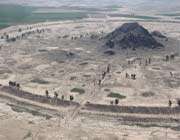World’s longest mud wall

Darabgard historical city, considered as one of the oldest cities of Iran and the world, is the first capital of Sassanian Empire, whose history can be traced back to more than 2500 years ago, i.e. to the Achaemenid era.
The city was made circular for security reasons and a giant pyramidal wall, made of bole, stone and lime mortar was made around the city whose height is more than 10 meters. This wall has been eroded by the passage of time and now its height is around 7 meters. The existence of sticky materials in the mixture of mortar and mud used in the wall has helped it remain stable and firm with little damage despite the passage of 2500 years.
For more protection a big ditch was dug behind the wall of the city, making access to the city very hard in case of a threat.
The depth of the ditch was more than 10 meters and its width around 50 meters. However, this part has been eroded. The ditch was always full of water and according to historians there were certain species of plants in it, which would wrap around the feet of those trying to enter the ditch to prevent them from swimming. The water required for the ditch was provided by the surrounding rivers like Bal River.
Darabgard City’s mud wall as the world’s largest and widest 2500-year-old wall is not still registered in the World Heritage List. According to experts the city is not only eligible to be registered in UNESCO’s list but some measures have been taken to get it registered with The Guinness World Records. The length of the wall around this Achaemenid era city is about 6 Km.
According to old historians and geographers Darabgard city was very thriving until sixth century hegira, but because of devastating attacks and civil wars it was ruined and destroyed. Its inhabitants after migrating from Darabgard to Tang Ranbe Visbar moved to current Darab City. There is no distance from current Darab City to historical salty dome of Darabgard City.
By Rahimeh Zargar
Translated by: Sadroddin Musawi
Other links:
Ancient Cities and Archaeological Hills, Fars
Inscriptions and Engravings, Fars
Fire Temples, Fars